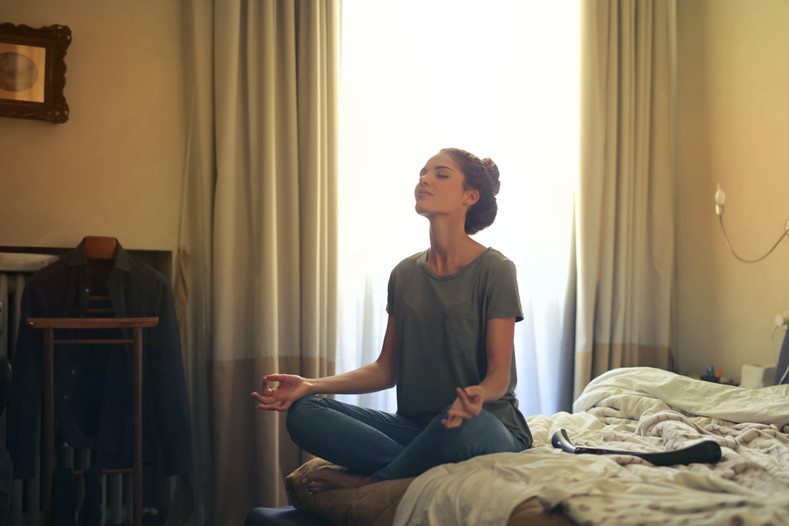Insomnia can be a frustrating problem, but there are natural methods that can help combat it without having to turn to sleep medications. Here are some effective natural methods for insomnia:
- Meditation and mindfulness (mindfulness): Regular practice of meditation and mindfulness techniques can help reduce stress and anxiety, which are often the cause of insomnia. These techniques can help calm the mind and prepare for sleep.

- Yoga and tai chi: Gentle exercises such as yoga and tai chi can promote physical and mental relaxation, helping to prepare the body for sleep.
- Herbal remedies: Some herbs, such as valerian, lemon balm, chamomile and hops, are known for their calming properties and can be used in the form of teas, capsules or essential oils.
- Aromatherapy: Using essential oils, such as lavender, can help create a relaxing environment conducive to sleep.
- Relaxation techniques: Techniques such as deep breathing, progressive muscle relaxation and visualization can help reduce stress levels and make it easier to fall asleep.
- Dietary change: A diet rich in tryptophan, magnesium and B vitamins can help improve sleep quality. This includes foods such as bananas, nuts, seeds, whole grains, fish and dairy products.
- Limit caffeine and alcohol: Caffeine and alcohol can disrupt the sleep cycle, so it’s a good idea to limit their consumption, especially in the afternoon and evening.
- Regular physical activity: Exercise, especially aerobic exercise, can improve the quality of your sleep, but avoid intense exercise just before bedtime.
- Optimize the bedroom environment: Creating an environment conducive to sleep, such as a dark, cool and quiet environment, can help fight insomnia.
- Stress management techniques: Learning to manage stress, such as through relaxation techniques, journaling, therapy or other stress management methods, can help improve sleep.
- Regular sleep schedule: Maintaining a regular sleep schedule, even on weekends, can help regulate the diurnal rhythm and improve sleep quality.
- Avoiding long naps during the day: Long naps can disrupt nighttime sleep, so it’s better to limit them to short, restorative 15-20 minute naps.
- Bedtime restriction techniques: If insomnia is a problem, bedtime restriction techniques, such as getting up when you can’t sleep and going back to bed only when you’re sleepy, can be effective.
- Consultation with a specialist: In the case of chronic insomnia, it is worth consulting a doctor or therapist who can help find the cause of the condition.
- Reading before bed: Reading a book can be an effective way to calm the mind. Choose light literature that doesn’t stimulate too much thinking and allows you to relax.
- Practicing gratitude: Spending a few minutes thinking about what you are grateful for can help you relax and improve the quality of your sleep by reducing stress.
- Using nature sounds or white noise: Listening to peaceful nature sounds or white noise can help you fall asleep by creating a calming background and masking disruptive sounds.

- Avoid heavy meals before bed: Eating large, heavy meals just before bedtime can disrupt the process of falling asleep. Choose light evening meals to avoid stomach discomfort.
- Reduce exposure to stressful situations in the evening: Try to avoid stressful activities or discussions in the evening that can make it difficult to fall asleep.
- Use of orthopedic pillows: The use of properly selected orthopedic pillows can help maintain proper posture, which contributes to better sleep.
- Consider supplementation: Some supplements, such as magnesium, melatonin or calming herbs, can be considered as natural sleep aids, but always after consulting your doctor.
- Listening to relaxing podcasts or audiobooks: Listening to peaceful stories or guided meditations can be helpful for falling asleep.
- Consider behavioral therapy: Cognitive-behavioral therapy for insomnia (CBT-I) can be effective in the long-term management of insomnia.
- Create a pleasant evening routine: An evening routine that is pleasant and relaxing can help prepare you for sleep. This can include a warm bath, listening to music or other relaxing activities.
- Establish clear boundaries for work and sleep: Limiting work and other stressful activities to certain hours of the day can help create a clear line between time for rest and time for sleep.
Using these natural methods can help improve the quality of sleep and reduce insomnia without the need for sleep medications. It is important to remember that everyone is different and different methods may work for different people.
